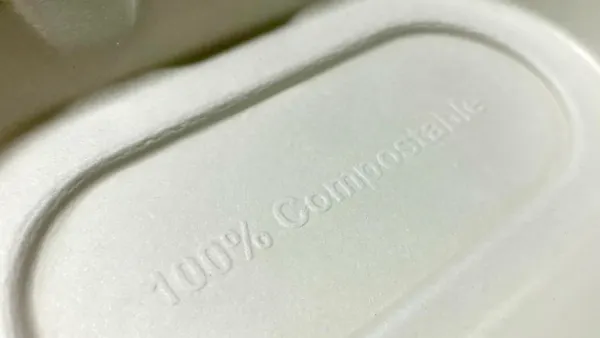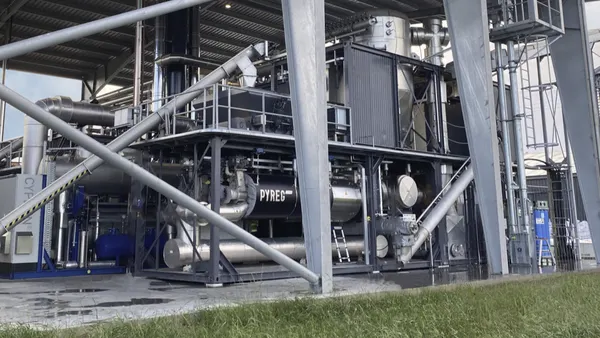Organics recycling may still be perceived as the next frontier for many state and local governments, but it's far from a new concept. Amid growing concern over the climate crisis, however, it's beginning to receive renewed attention.
In her latest issue, BioCycle Editor Nora Goldstein outlined why she thinks the issue is more relevant than ever. After covering a recent speech from the vice president of Project Drawdown — a group that has listed food waste reduction as its #3 "no regrets" solution to reducing GHG emissions — along with a New York Times climate op-ed entitled "Time to Panic," Goldstein concludes with the following:
BioCycle has been advocating action for about 40 years — two-thirds of our 60-year existence. What is different in 2019 than in 1979 is that not a day goes by without dramatic illustration of climate change impacts.
What to do? Panic and Prosper. Panic fuels the urgency to act now. It is the reality that keeps us on task everyday to implement No Regrets Solutions. Prosper is the 'reward' — monetary, societal, planetary — for implementing the solutions.
These themes will be central to the upcoming BioCycle WEST COAST19 conference in Portland, Oregon. Waste Dive spoke with Goldstein to learn more about how food waste action ties into climate solutions, and what to expect at the 32nd edition of this annual event.
The following interview has been edited for clarity and annotated for context.
WASTE DIVE: It feels like the current discussion around recycling food waste is often very focused on the economic question of whether it's cheaper than disposal. Has that always been the case in your experience, or have we headed away from a more holistic conversation into this more narrow economic mindset?
NORA GOLDSTEIN: I think we've headed away from the more holistic whole-system solutions.
Back in 1960, when BioCycle was started as Compost Science, it was really about resource management and introducing the concept of "we don't want to burn or bury these resources. We need to recycle them back through the system."
So I think what we've lost sight of is that really we're not so much thinking about managing resources, but managing waste. When you just get into managing waste, then you start to go to, "Well, it's cheaper, easier, less complicated to just throw it away. It's more expensive, but less complicated, to burn it."
[Recycling materials is] more complicated, but more regenerative ... You capture them, put them back in the system, capture them, put them back in the system – whether that's your organics or it's your recycling.
While it also previously covered the broader world of recycling, BioCycle honed in on organics in the mid-'90s and has become particularly focused on integrated infrastructure in the decades since.
Through that lens, Goldstein says compost can be a "really good tool for stormwater management and erosion control." It's proven to help slopes revegetate more quickly — crucial for public works projects — and also yields wildlife protection benefits, as demonstrated by projects such as Soils for Salmon in Washington state. Using this policy framework to drive decisions is different from implementing broad organics disposal bans, which Goldstein says may not always lead to fully integrated solutions.
It's become common to hear some waste service providers say they'll usually only deal with organics collection in markets with regulatory drivers. But we're also seeing growth in programs outside of those markets. In areas where this is happening, is the integrated approach what's driving that?
GOLDSTEIN: Definitely, the integrated approach.
Goldstein cites the Chicagoland area of Illinois, which does not have a landfill ban on food waste, as an example.
[In Illinois], they were composting yard trimmings and began focusing on diverting food waste from disposal ... What you're seeing in that general area are the cities, the solid waste districts all around, adding food waste into their residential organics collection because they do have carts, and then they can add the food waste stream into that. So there's a mechanism right there.
I don't think you hear as much there about the greenhouse gas reduction. But what happened there, it's really looking at the use of compost in agriculture in landscapes for stormwater management. To that effect, last year, the legislature passed a bill that essentially requires public agencies [doing landscaping projects with off-site soil to request bids for compost, and use it if the cost is equal or less to soil.]
They're doing more market usage incentivization than "thou shall keep your food waste out of a landfill."
Minnesota is also cited as a state that doesn't have a landfill ban, but has local governments such as Hennepin County setting new diversion mandates and encouraging infrastructure development as a result.
So there are clearly examples of growing interest, sometimes with regulatory drivers in place to kick things off, but it feels like people are paying attention to this more — especially with the climate conversation, as you pointed out in your latest editor's note. Is it accurate to say that food waste action is getting viewed as more of a climate solution than in the past?
Goldstein cites the Natural Resource Defense Council's seminal 2012 "Wasted" report and the 2016 ReFED Roadmap as key recent inflection points that led to this juncture.
GOLDSTEIN: When you're throwing away so much food, it's across the value chain. You're wasting so many resources — and those resources, some of them have pretty significant carbon footprints. So you've got that element to it.
And then what is so interesting is when you overlay the social and public health, this degree of food insecurity, you're tying these different threads together just around food that were completely disconnected.
The cities realizing that they can connect these initiatives much more overtly, they have to really own that. And then they have to continue to keep pushing. Because what's happening with some of the initiatives in the city of Baltimore, for example, they're really tying it into community gardens, urban farms, youth employment.
[The Baltimore City Council recently] passed a bill that is expected to eventually shut down the incinerator. Their landfill has a limited life. So they're looking at building capacity that's not just building up a huge digester or a huge composting facility, but also what they can do to address other challenges within their economic and social and public health realm.
The whole thing with the "No Regrets" solution is you can't go wrong taking vacant lots, bringing those soils back to life with compost and then growing things. And then encouraging residents to bring their food scraps so you can compost them — and all along that value chain creating jobs within that community. Growing food within that community, value-added food businesses.
So I don't think we really recognize or honor, if you will, those kinds of whole system solutions. You can enter that conversation from just about anywhere and have it be relevant to you.
From a climate resiliency standpoint, it also seems like this has potential to help local governments build more local community relationships, become more self-sufficient in terms of food supply and materials management. Figuring out how to monetize that in our current system seems like it might be difficult, though.
GOLDSTEIN: Exactly. I think that's the thing — you can monetize that. You just have to take other costs into account.
I'll go back using Baltimore again as the example. When Sally Brown with the University of Washington was doing her PhD work at the University of Maryland, and she was focusing on biosolids, there was — and there probably still is — a rising asthma rate in urban neighborhoods where there were vacant homes [and] vacant lots. There was so much airborne dust, and there was also a lead issue. So she did a whole research study of applying biosolids compost to those vacant lots and growing grass.
It did two things. It reduced the airborne dust, and it reduced children playing in those lots and their hands getting dirty and then ingesting the soil. So if you were to actually monetize the public health benefit, or the health cost ... our accounting systems don't reflect that.
Goldstein also cites examples of compost being used to help with water filtration and stormwater management, but those projects are often not being recognized in the same way as traditional concrete infrastructure might be from an accounting standpoint.
With all this in mind, are there any sessions at BioCycle WEST COAST19 that really get at the urgency of finding more solutions for organic waste?
GOLDSTEIN: I'll point to our opening plenary think tank [on April 2]. Each individual works within whole-system solutions.
The session will feature Stephen Jones, director of The Bread Lab at Washington State University, who brings an economic development angle from his work growing non-commodity wheat — an enterprise that makes the region more resilient to supply chain disruptions. Ned Foley, owner of the farm Two Particular Acres in Pennsylvania, is doing a variety of work using soil amended with compost to grow barley for regional craft brewers. Sally Brown of the University of Washington is focusing on urban food systems, and Rhys Roth of the Center for Sustainable Infrastructure focuses on sustainable infrastructure and accounting.
So whether you're a composter, you're an anaerobic digester, you're a hauler, you're a municipal official designing programs, you can look and listen and learn about these opportunities and how they're integrated. You go back with a broader vision of what opportunities and solutions you can implement.









